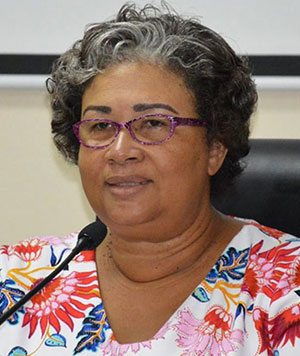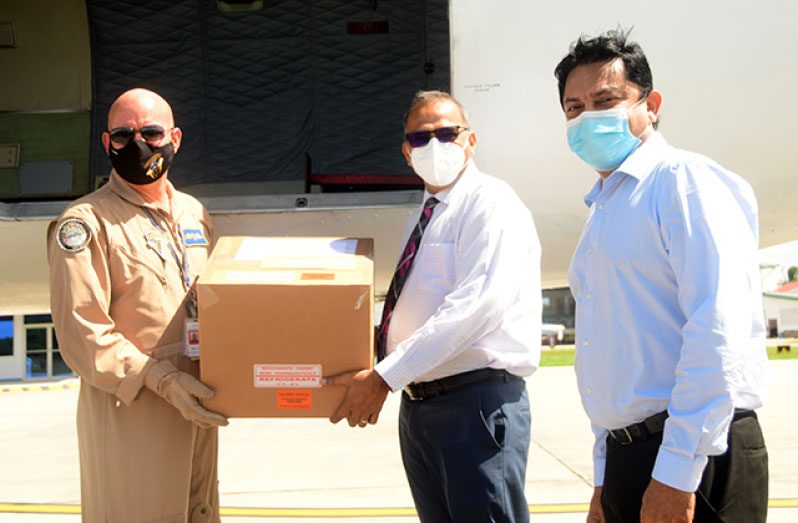…but disparities in procurement a concern, CARPHA head says
EXECUTIVE DIRECTOR of the Caribbean Public Health Agency (CARPHA), Dr. Joy St John, says that the Caribbean has approached its vaccination rollout strategically, noting that vaccinating a significant portion of the population is a mechanism through which herd immunity can be accomplished, thereby allowing countries to exit the COVID-19 pandemic.
“We sat and we watched at the end of last year, big countries like the United States (US), Canada and the United Kingdom (UK), who were able to purchase vaccines, we watched their citizens getting immunised… the Caribbean was strategic enough to allow procurement after, even if it was initially by donation, through philanthropy,” Dr. St. John said, in an exclusive interview with the Sunday Chronicle.

Though these countries were able to pre-order tranches of vaccines, issue Emergency Use Authorisation (EUA) and begin immunising their populations while the rest of the world was still trying to make arrangements for procurement, Dr. St. John explained that this allowed the Caribbean region to commence its vaccination rollout with approved vaccines.
The Oxford-AstraZeneca, which has been donated to countries in the Caribbean from India, was granted EUA by the World Health Organisation (WHO) by the time distribution began in February. Barbados and Dominica were the first countries to receive this vaccine, which is produced by the Serum Institute of India and is called ‘Covishield’.
Subsequently, those two countries donated smaller portions to other Caribbean countries. Guyana received 3,000 doses from Barbados and was able to commence vaccinating some of its frontline health care workers. On Monday, Guyana will receive its own donation of ‘Covishield’ vaccines from India.
As such, CARPHA’s Executive Director posited, “The Caribbean was supremely strategic in how it has gone about getting vaccines.” She also noted that ahead of the vaccination rollout in Caribbean countries, the Pan-American Health Organisation (PAHO) and the World Bank were involved in surveying the readiness of countries to vaccinate their adult populations against COVID-19.
Legislation, communication, storage and equipment were among the areas of readiness surveyed. And, Dr. St. John explained that this allowed Caribbean countries to gauge whether they would distribute the vaccines to their adult populations quickly and safely.
“So, the procurement has allowed these systems to be actually tested before the COVAX supplies start arriving… so it isn’t just that we say we are ready, but we’ve actually been doing it with the Covishield, so you know actually getting it to people.”
COVAX FACILITY
Months ago, Caribbean countries signed up with the COVAX facility, which is geared at accelerating the development and manufacture of the COVID-19 vaccines, and then providing them in a guaranteed rapid, fair and equitable manner. COVAX is coordinated by GAVI, the Vaccine Alliance, the Coalition for Epidemic Preparedness Innovations (CEPI) and the WHO. And, all of the countries participating in COVAX, regardless of income levels, will have equal access to these vaccines once they are developed.
“The initial aim is to have two billion doses available by the end of 2021, which should be enough to protect high risk and vulnerable people, as well as frontline healthcare workers,” the GAVI website noted.
GAVI also noted, “For lower-income funded nations, who would otherwise be unable to afford these vaccines, as well as a number of higher-income self-financing countries that have no bilateral deals with manufacturers, COVAX is quite literally a lifeline and the only viable way in which their citizens will get access to COVID-19 vaccines.”
Under the COVAX mechanism, Guyana will be receiving its first tranche of vaccines- which is expected to immunise some 20 per cent of the population- for free. These vaccines are expected to arrive sometime this month.
“If the Caribbean people are anything, they are practical (and) pragmatic. I say that what the Caribbean did was that they observed what was going on and they made their own conclusions,” Dr. St. John contended.
“They decided ‘Okay well this is going on in x country- this is good we were going to do this, or this is not going well we will not do this’ and I think that observation and application of best practices have served the Caribbean well.”
DISPARITIES IN PROCUREMENT
Despite the Caribbean’s pragmatism, however, there is still the overarching concern of vaccine nationalism and Dr. St. John said the fact that less than 10 countries of the world have the majority of vaccines cannot be negated.
“We have not been able to access vaccines the way we anticipated… suppliers are saying they are unable to accept orders from us because the large countries are purchasing them out,” Chairman of the Caribbean Community (CARICOM), Prime Minister of Trinidad and Tobago, Dr. Keith Rowley, said during a virtual press conference following the conclusion of the 32nd inter-sessional meeting of CARICOM Heads of Government
The Trinidadian Prime Minister also raised his concerns at a recent WHO forum, where he lamented the disparities in vaccination procurement.
“The Chair of the Conference of Heads of Government, the Honorable Keith Rowley was very correct to make a strong statement on this and to go to the WHO to make it there too,” the St. John affirmed.
She also lamented, “We witnessed some very unfortunate things happen to the Caribbean and we cannot afford to sit back and not say anything and it happens with vaccines.”
Dr. St. John emphasised that unless a great majority of people are immunised, the Caribbean will be struggling with the virus and its ramifications for a long time.
She, however, acknowledged, “We have been really punching above our weight in the way that we have approached the management of the COVID-19 pandemic and we should continue with that during the vaccination.”



.jpg)











